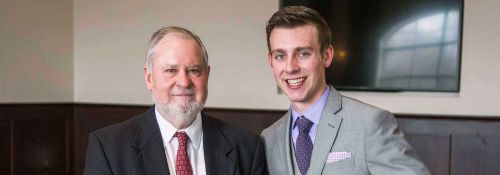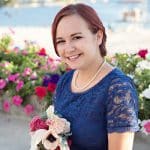
Jonathan Church, ’17, On Competitive Speaking at Hillsdale
Interview by Chandler Lasch
Senior Jonathan Church took third in the Edward Everett Oratory Competition his sophomore year, won it last year, and plans to compete again this semester.
The College hosts the competition annually, with the newly renamed Department of Rhetoric and Public Address presenting. Students write and memorize speeches on a given topic and compete for a prize of three thousand dollars.
Here Jonathan, who is finishing up his undergraduate studies in classics and philosophy with a minor in classical education, describes his experience competing in the Everett contest and mock trial.
* * * * *
How did you become interested in public speaking?
I did mock trial in high school. I was planning to go to law school, so my general interest in public speaking stemmed from there. When I came to school here, I wanted to push myself to try and do some different types of speaking events without getting into actual speech and debate competition on the team. I decided that I would like to try to do the Edward Everett Oratory Competition, which usually has more political topics.
Why not speech and debate competition?
Because I am involved in the mock trial team. I captain one of the teams, and I’m the team manager. So, that’s the competitive speaking discipline I choose to do. But I still wanted to do some more traditional speech alongside that.
Why do you compete in mock trial? What do you like about it?
Originally, I was doing it because I wanted to get experience for law school, and then I just loved it for its own sake once I started. It’s an excellent way to improve your public speaking skills, especially in a team environment. It’s something where you have to take a group of five other people and learn to think and speak as one group.
What is the hardest part about competing in the Everett Oratory Contest for you?
Honestly, the time limit. In mock trial you have time constraints, but you’re watching the time cards go down, and you can edit your content to fit your time. With Everett you have ten minutes, and you’re judged based on your time. If you go outside of the fifteen-second-or-so grace period, you can get marked down a lot. When you start that speech, you have to have the right pace to hit roughly ten minutes. And so, the temptation is speeding up or going too slow at the start.
What was your speech on last year, when you won?
Last year our topic was on debate and conversation on college campuses. My speech sought to look for the reason why campus debates on civic issues like free speech, race, academic freedom, etc., have devolved from conversations or debates to displays of irrational protest on many college campuses. I addressed the issues underlying those phenomena. I was arguing that the moral premises on which people ground their arguments—things like natural rights—are abstract and difficult to define and agree on. And that’s the root of a lot of the campus debate we were seeing that was pretty antagonistic. These protests were stemming from a problem of having disagreement on what constitutes a grounds for basic morality. The bigger problem was that we can’t have agreement on moral issues because we don’t have moral premises that we all agree on.
Why is it helpful to be good at public speaking?
If your delivery is poor, it’s tough to reach people. I would definitely say that your presentation—everything from being pleasing to other people to the euphony of what you say and how you say it—affects your overall persuasiveness a great deal.
Do you have any tips for someone just starting out in public speaking, especially since the fear of public speaking is something a lot of people share?
First of all, just do it. You can. Second, be simple. A lot of people think that in an oratory contest you really have to use complicated clause structure and such. Don’t. It’s just going to trip you up. For your first couple of times, use very simple language. Honestly, the judges usually like it better anyway. Understandability is huge in public speaking.
What are your plans for after graduation?
I’m planning to teach for a couple years before grad school, and then I plan to go into administration education, ideally as headmaster. I’m thinking probably K-12 in a classical or charter school.
 A resident of sunny Southern California, Chandler Lasch, ‘18, is currently studying history and theatre. She enjoys graphic design, iced hazelnut lattes, and Disney movies.
A resident of sunny Southern California, Chandler Lasch, ‘18, is currently studying history and theatre. She enjoys graphic design, iced hazelnut lattes, and Disney movies.